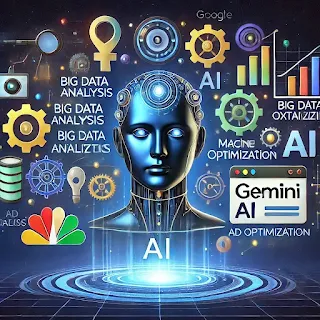What AI Technologies Does Google Use? A Comprehensive Guide (2025 Update)
- Get link
- X
- Other Apps
What AI Technologies Does Google Use? A Comprehensive Guide (2025 Update)
Introduction
Google is one of the leading companies in artificial intelligence (AI), utilizing advanced algorithms to enhance search, data analysis, and user experience. In this article, we take an in-depth look at the AI technologies used by Google, their impact on search engine optimization (SEO), and how businesses can optimize for these advancements.
1. Google's AI Algorithms and Their SEO Impact
1.1 RankBrain
RankBrain is one of Google's first machine learning systems designed to improve search results by analyzing user data and delivering more relevant results. 📌 SEO Tip: To optimize your website, focus on creating high-quality and user-friendly content that aligns with user intent.
1.2 BERT (Bidirectional Encoder Representations from Transformers)
BERT helps Google better understand natural language and the contextual relationships between words in a sentence. This algorithm significantly enhances semantic comprehension. 📌 SEO Tip: Writing natural and fluid sentences makes your content more understandable for BERT and improves rankings.
1.3 MUM (Multitask Unified Model)
MUM is an advanced version of BERT that can process multiple languages and analyze both text and images simultaneously. 📌 SEO Tip: Leverage structured data and multimedia content to align with MUM’s capabilities.
1.4 Neural Matching
This algorithm helps Google better understand user intent, enabling the display of more relevant search results. 📌 SEO Tip: Focus on creating content that directly answers user queries to improve visibility.
 |
2. Google's AI Services and Their Applications
2.1 AI Overviews
Google employs AI Overviews to provide summarized search results, helping users find answers more efficiently.
2.2 Gemini AI and Vertex AI
Gemini AI and Vertex AI are Google's latest AI-driven solutions for advanced data processing and ad optimization. Gemini AI enhances natural language processing in Search and Translate, while Vertex AI optimizes big data analytics and advertising campaigns. 📌 SEO Tip: Use AI-generated insights to refine content strategy and keyword optimization.
 |
3. Impact of AI on SEO
3.1 Increased Importance of Content Quality
Google’s AI identifies and removes low-quality, keyword-stuffed content. High-value content ranks better. 📌 SEO Tip: Focus on depth, accuracy, and engagement in your content.
3.2 Voice Search and NLP
With the rise of voice search, optimizing content for conversational queries has become crucial. 📌 SEO Tip: Use long-tail keywords and natural language phrases to rank in voice search.
3.3 User Experience (UX) and Core Web Vitals
Google prioritizes sites with excellent UX, fast load times, and mobile-friendly designs. 📌 SEO Tip: Optimize your website speed with tools like Google PageSpeed Insights.
 |
4. How to Optimize Your Website for Google’s AI
✅ Create Valuable Content: Ensure content is comprehensive, accurate, and relevant. ✅ Optimize for Voice Search: Use natural language and answer common questions. ✅ Improve Site Speed: Utilize tools like Google PageSpeed Insights and CDN solutions. ✅ Use Structured Data: Enhance visibility in Google search results. ✅ Internal and External Linking: Boost page authority by linking to authoritative sources and related content within your website.
📷 Suggested Image Placement: An example of structured data in search results.
5. FAQ Section
❓ How does BERT affect long-tail keywords?
BERT improves Google’s understanding of natural language, allowing it to process long-tail queries more accurately.
❓ What’s the difference between MUM and BERT?
MUM is a more advanced model that processes text, images, and even multiple languages simultaneously, whereas BERT focuses solely on textual understanding.
❓ How does AI impact mobile-first indexing?
Google prioritizes mobile-friendly pages with fast load times, ensuring a better user experience across all devices.
Conclusion
Artificial intelligence plays a crucial role in how Google displays and ranks websites. To succeed in the digital landscape, businesses and content creators must adopt AI-friendly optimization strategies. Producing valuable content, implementing technical SEO, and enhancing user experience are key to thriving in this AI-driven era.
📌 Have you applied these techniques to your website? Share your experience with us! 🚀
References
Google AI Blog: https://ai.googleblog.com/
Search Engine Journal: https://www.searchenginejournal.com/
Moz SEO Blog: https://moz.com/blog
Google Developer Documentation: https://developers.google.com/search/docs
- Get link
- X
- Other Apps




Comments
Post a Comment